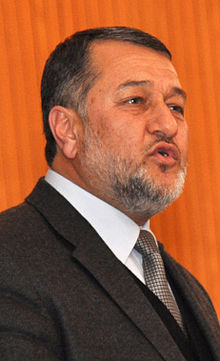Bismillah Khan Mohammadi
| Bismillah Khan Mohammadi | |
|---|---|

Bismillah Khan in May 2012
|
|
| Minister of Defence | |
|
In office 15 September 2012 – 24 May 2015 |
|
| President |
Hamid Karzai Ashraf Ghani |
| Preceded by | Enayatullah Nazari (acting) |
| Succeeded by | Mohammed Masoom Stanekzai (acting) |
| Minister of Interior | |
|
In office January 6, 2010 – September 15, 2012 |
|
| President | Hamid Karzai |
| Preceded by | Mohammad Hanif Atmar |
| Succeeded by | Mujtaba Patang |
| Chief of Staff of the Afghan National Army | |
|
In office March 8, 2002 – January 6, 2010 |
|
| President | Hamid Karzai |
| Succeeded by | Sher Mohammad Karimi |
| Personal details | |
| Born | 1961 Panjshir, Afghanistan |
| Political party | Jamiat-e Islami |
| Religion | Sunni Islam |
| Military service | |
| Allegiance | Afghanistan |
| Service/branch | Afghan National Army |
| Rank | General |
| Commands | Chief of Staff of the ANA |
Bismillah Khan Mohammadi (Persian: بسمالله خان محمدی; born 1961 in Panjshir Province), or Bismillah Khan, is the former Defense Minister of Afghanistan. From 2002 to 2010, he served as Chief of Staff of the Afghan National Army and from 2010 to 2012 he held the post of Interior Minister of Afghanistan. He has an anti-Taliban background and once served as a senior commander under Ahmad Shah Massoud.
Bismillah Khan Mohammadi was born in 1961 in the Panjshir Province of Afghanistan. An ethnic Tajik, he is the son of Ghausuddin of the Panjshir Valley. After graduating from 14th grade in Abu Hanifa Seminary he enrolled at Kabul Military University. Mohammadi was a former PDPA Parcham member, but after the Soviet invasion of Afghanistan he aligned himself with mujahideen resistance commander Ahmad Shah Massoud.
When the Taliban gained control over large parts of Afghanistan in 1996 establishing their Islamic Emirate of Afghanistan, Bismillah Khan served as Deputy Minister of Defense of the anti-Taliban and still recognized Islamic State of Afghanistan. He was a senior commander in the anti-Taliban resistance, the United Front (Northern Alliance), led by Ahmad Shah Massoud. After the attacks of September 11, 2001, and the subsequent fall of the Taliban regime through United Front ground troops and the U.S. Air Force, Bismillah Khan was appointed commander of Kabul's police force and became a member of the Kabul Security Commission. During that period the security situation in Kabul was better than in other parts of Afghanistan.
...
Wikipedia
